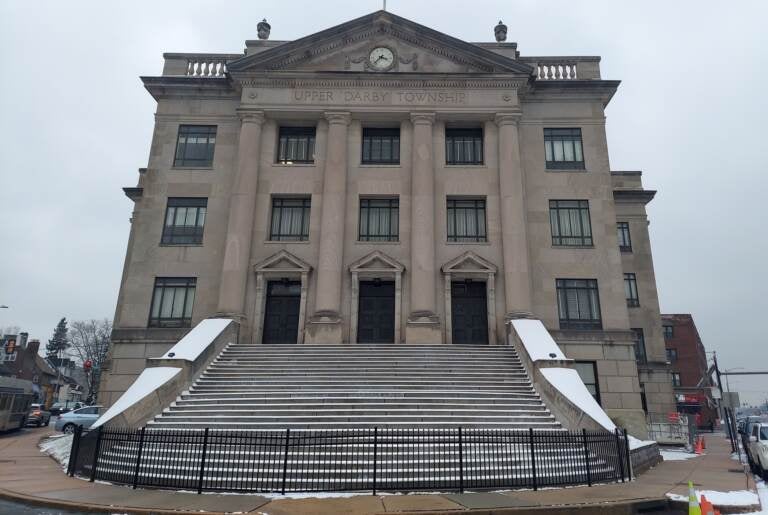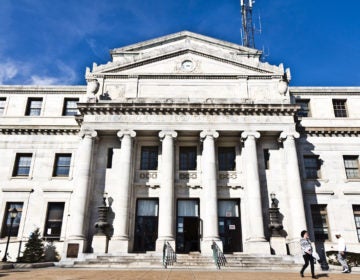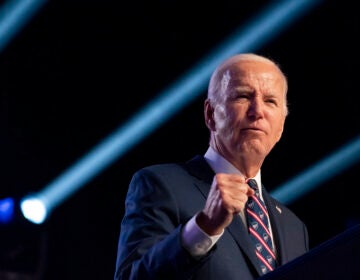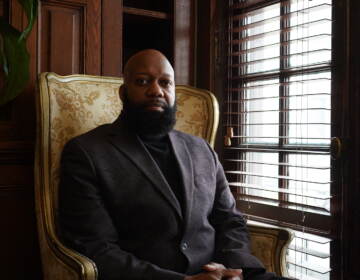Upper Darby narrowly avoids government shutdown amid claim of missing American Rescue Plan funds
Factions of the township government were at odds over an allocation of American Rescue Plan Act funds to keep things running and pay township workers.

A view of the Upper Darby Township building in Delaware County. (Upper Darby Council/Facebook)
What’s important for us to know about Philly’s suburbs?
A recently announced fiscal crisis has had Upper Darby Township — Philadelphia’s largest suburb, with about 86,000 residents — in a state of chaos over the past week as questions about accounting cast a shadow over a large portion of the township’s $20.8 million in federal COVID-19 relief funds.
Frustrations came to a boil Monday during a special emergency meeting called by Mayor Barbarann Keffer as factions of the municipal government went toe-to-toe over an allocation of American Rescue Plan Act funding to keep the government running and pay township workers.
Ultimately, the Township Council voted, 10-1, to approve an ordinance allocating $6 million in American Rescue Plan money designated for lost revenue to finance the local government, which had been critically low on operating funds.
“There’s a reason why we were granted the $6 million, and that’s the number that the federal government came up with. So we just want to use the money for the good of the community,” Keffer said in an interview with WHYY News.
There will also be an independent “examination” of Upper Darby’s finances over the past few months to determine how previous discrepancies came to occur in an account balance holding the money.
“I’d like to reiterate that my administration has nothing to hide from the public or council, and we look forward to an independent review of the financial situation … which we inherited as well as the situation over the last two years,” Keffer said.
Chief Administrative Officer Vincent Rongione blamed the disagreement on “political games.” The bipartisan group of six council members who previously voted to table the ordinance argued that $6 million of the funding was missing.
During his regular report to the Township Council at its Feb. 2 meeting, township Treasurer David Haman raised questions about why an Upper Darby bank account that was supposed to have all $20.8 million of the American Rescue Plan money was short $6.3 million.
The township has roughly 45 bank accounts — 11 of which constitute the general fund budget. The accounts are managed by the township’s administration, not the Township Council.
Haman told WHYY News in an interview that part of what made him question the balance was the lack of supporting information on how each account got to where it was supposed to be.
“The account that for several months contained the $20.8 million of COVID relief funds from the American Rescue Plan was below the $20.8 million balance that had been there. And my question was simply: why?”
At the end of November, there was $26 million in that account, Haman said. The balance dipped to $14 million in December.
“The big problem, I think, here, which makes it very, very hard to figure out what actually transpired, was that the money was commingled — the American Rescue Plan money was commingled with the other unrestricted funds,” Haman said.
He added that he never intended to be accusatory.
“If you listen to that recording of the meeting, I just said, ‘I’m not accusing anybody of anything. I just would like to know why that account is below $20.8 million.’ And all hell broke loose at that point,” Haman said.
Prior to Monday’s special meeting, Councilmember Matt Silva told WHYY News that the accounting issues could have been avoided.
“The finance committee has repeatedly asked the Upper Darby Township administration to put the ARPA funding in a separate account, so that there would be no confusion as to what was spent or what was not spent, and they had not done that,” Silva said.
As a Democrat, Silva said he agreed with a lot of the things in the ARPA proposal that Mayor Keffer had put forth. But there is a line, he said, and he maintained that he and the five other members of the bipartisan group were upholding their oaths to be “accountable.”
“Something is wrong. And I can’t in good conscience as an elected official, as someone who represents 85,000 people, agree to give someone this much money if they can’t explain what happened to the money that was there previous,” Silva said. “At no time were we told that we needed any part of the ARPA fund to cover anything for the township … this was all supposed to be kind of a stimulus program [from] the federal government. It wasn’t supposed to be, like, keeping the lights on.”
On Monday, Rongione provided a letter from the Pennsylvania Local Government Investment Trust showing that the township had an account titled UDT ARPA Fund Account with $20.8 million that matched the entirety of the American Rescue Plan Act funds received.
“We do take the concerns very seriously. We have endeavored to separate the funds from an accounting perspective and separate the funds into now a completely separate account with $20.8 million in it. So, I think that what you got is a little bit of inexperience,” Rongione told WHYY News.
Rongione added that Haman should have given his report to the township administration first if he had questions or concerns. Rongione believes Haman “chose to ambush” him and the mayor.
“It was clearly intended as a sneak attack. Right? If it had been presented in advance, we would have been able to show the treasurer exactly where the money is, and that the $20.8 million was available,” Rongione said.
Councilmember Hafiz Tunis Jr. said he was more concerned about COVID relief being delayed, noting that he felt as if some fellow council members had repeatedly moved the goalposts. He also downplayed concerns regarding unaccounted-for money.
“If there’s misuse of funds, the federal government will definitely be able to act on it. They have a 98% conviction rate for a reason,” Tunis said.
However, he said he was certain that the money was, indeed, there and not missing.
Prior to Monday’s special meeting, the council and the administration had come up with a number less than $6 million to fund just the township payroll while the situation got sorted out.
The plan changed, though. The Township Council decided to vote in favor of allocating that $6 million in ARPA funding to “lost revenue” to finance the government — but only after hours of public comment and back and forth between government officials about transparency and paying municipal workers.
‘Where’s the money?’ isn’t the only issue
About 30 minutes into the public meeting, it became clear that a lack of communication was part of the issue. Council President Brian Burke said that it was important to work together — but also that he didn’t appreciate seeing Rongione’s proof of a fully funded ARPA coffer on CBS3 first.
“As we work together, we have asked for things. We have received them. We’ve had miscommunications, but to receive this wonderful letter today where [reporter] Joe Holden posted it first is not transparency,” Burke said.
He tore into the independent audit proposed by Keffer because she did not publicly disclose the company’s name in her announcement.
One member of the public contested the validity of Rongione’s letter from the Pennsylvania Local Government Investment Trust. Gary Merron — the township’s former finance director, who resigned over the weekend — came to the podium and cited his 40 years of experience as a certified public accountant.
“This particular cash crisis is just the first in what I fear will be a continuing parade of management mistakes if action is not taken. This, in large part, is why I tendered my resignation,” Merron said.
He had scathing words for chief administrative officers past and present, who he believed were “unfit” for their jobs, having “neglected” proper financial practices over the years.
“Upper Darby is a $90 million-a-year enterprise whose accounting systems and methods more closely resemble that of a Kool-Aid stand,” Merron said.
Merron categorized the letter that Rongione provided from the Pennsylvania Local Government Investment Trust as “convenient,” considering that as of Jan. 28, the last time Merron was in the township building, “this account did not exist.” Merron said the money was moved from special-purpose township bank accounts to produce this result, which is why he believes any audit done on township finances should report to the council and not to the administration.
Though Merron wasn’t the only person expressing concern over transparency, some community members, as well as township employees and their families, wanted the attention to be focused on making sure municipal workers would be paid.
Resident Jennifer Hallam admonished council members for engaging in “political nonsense.”
“I don’t care when that documentation was produced … the money is there. There is no money that’s lost. We know where our money is, OK? OK, so we need the council to allocate that money so that people can get paid, so that I can stay at home and do my job and get paid for the hours that I just took off here so that our streets get cleaned up, the trash can get picked up, and we can do good things for this township,” Hallam said.
Resident Kyle McIntyre told the council that while he initially had questions about the money after the previous meeting, he felt as if the letter Rongione provided was enough to pass the ordinance allocating the $6 million. However, he had criticism for all the elected leaders in the room for the way they had conducted themself over the past week.
“The way that council treats each other, the way that council treats the administration, and vice versa, is an embarrassment to this township. And in all honesty, I don’t know how some of you even showed your face today,” McIntyre said.
Given the infighting, he said his biggest fear was that local government was becoming more like its federal counterpart.
“And that’s shameful, for God’s sake, I’m 23 freaking years old, and I have to come up here and tell you guys that. Some of you are twice my age,” McIntyre said.
His comments elicited a “Watch it” from a member of the council — and some much-needed laughter from everyone in the room after a week of tension.

Saturdays just got more interesting.
WHYY is your source for fact-based, in-depth journalism and information. As a nonprofit organization, we rely on financial support from readers like you. Please give today.








